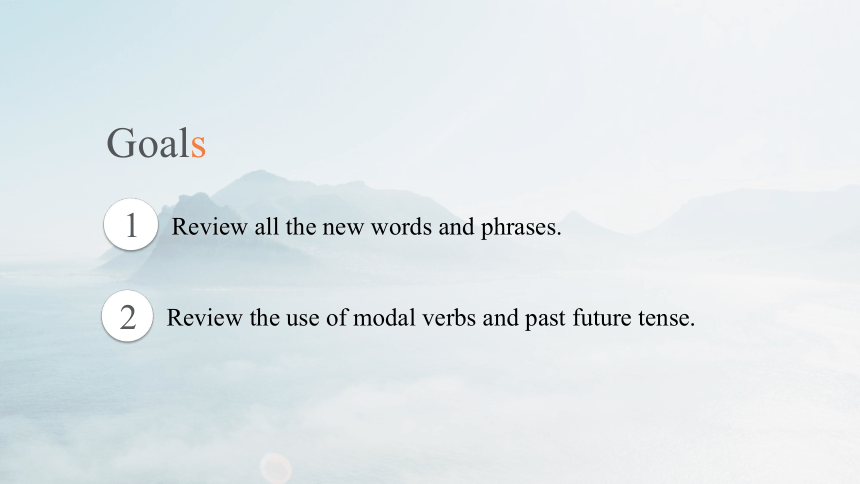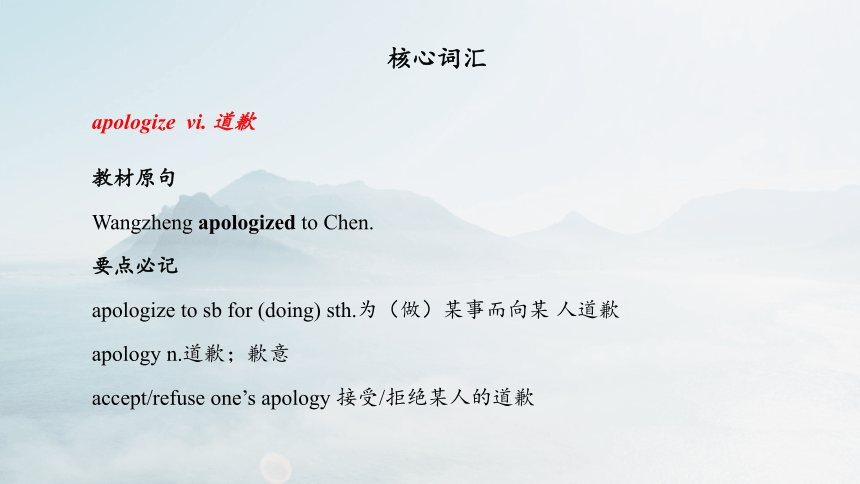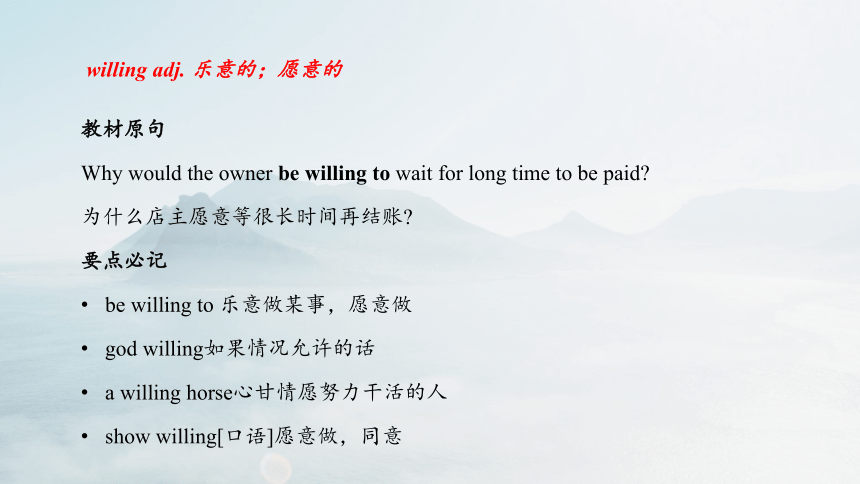人教版(2019)必修三:Unit 5 The Value of Money Revision 课件(21张ppt)
文档属性
| 名称 | 人教版(2019)必修三:Unit 5 The Value of Money Revision 课件(21张ppt) |  | |
| 格式 | pptx | ||
| 文件大小 | 621.8KB | ||
| 资源类型 | 教案 | ||
| 版本资源 | 人教版(2019) | ||
| 科目 | 英语 | ||
| 更新时间 | 2021-10-20 13:11:13 | ||
图片预览









文档简介
(共21张PPT)
Revision
Unit 5 The Value of Money
1
Review all the new words and phrases.
Review the use of modal verbs and past future tense.
2
Goals
apologize vi. 道歉
教材原句
Wangzheng apologized to Chen.
要点必记
apologize to sb for (doing) sth.为(做)某事而向某 人道歉
apology n.道歉;歉意
accept/refuse one’s apology 接受/拒绝某人的道歉
核心词汇
owe sb. an apology/owe an apology to sb. 向某人表示歉意
make an apology to sb (for...) (为)向某人道歉
patience n. 耐心;忍耐力;毅力
教材原句
Patience. if you don’t mind, may I ask how much money do you have
要点必记
have patience忍耐一下
patience with忍耐;反对
with patience耐心地
out of patience不耐烦;失去耐心
lose patience失去耐心
have no patience with不能容忍
broad adj. 宽阔的
教材原句
with a broad smile 带着一个大大的微笑
归纳拓展
broad, wide 这两个形容词均含"宽阔的"之意。
broad: 普通用词,指向两边延伸的宽度,强调两边之间面积的广阔,也可指向四方伸展开去。
wide: 常用词,侧重指两边或两点之间的距离。着重距离的远近。
abroad adv. 在国外
aboard adv. 登(船、飞机......)
permit v. 允许;准许;使有可能
教材原句
I’d love to ..with your permission 我想要你同意......
要点必记
permit sb to do sth 允许某人做某事
without permission 未经许可
willing adj. 乐意的;愿意的
教材原句
Why would the owner be willing to wait for long time to be paid
为什么店主愿意等很长时间再结账
要点必记
be willing to 乐意做某事,愿意做
god willing如果情况允许的话
a willing horse心甘情愿努力干活的人
show willing[口语]愿意做,同意
intention n. 目的;打算
要点必记
intend v. 目的;打算
intended adj. 故意的;有意的
intend to do 想要做;想要做某事
intend for 希望有或接到;打算成为…
basis n. 基础;根据;据点
教材原句
Is money the basis of a happy life 金钱是幸福生活的基础吗?
要点必记
(1) base. ..on/upon, 把…建立在… ;以…为根据
be based on 以…为根据(基础)
(2) basis n.原因,缘由;基准,准则;方式;基础
on the basis of 在…的基础上
(3) basic adj. 基本的;基袖的
某人第几次做某事
句式讲解
it is the first/ second/…. time that + 现在完成时
it was the first / second/…. time that +过去完成时
I am lucky because this is the second time I (have) visited Japan this year.
我很幸运,这是我今年第二次访问日本。
It was the first time this year that he hadn’t worked on a Saturday.
这是今年来他第一次在星期六不上班。
核心句式:
强调句
教材原句
It was the ship that brought you to the England.
是这艘船把你带到了英国。
句式讲解
基本结构:It is/ was + 被强调部分(通常是主语、宾语或状语)+ that/ who(当强主语且主语指人)+ 其他部分。
e.g. It was yesterday that he met Li.
Learn
情态动词
Learn
Complete the passages with suitable modal verbs or the correct forms of the verbs in brackets. Add not if necessary.
The saying "Don't judge a book by its cover" means that we_________judge the value of something
just based on its external appearance. This is a useful principle to remember when we meet new
people. We_________treat everyone we meet for the first time nicely, no matter how they look.
Most of us_________like to be judged on our appearance, because it be unfair to us. So
we_________remind ourselves to give new people v/e meet a fair chance. Anybody_________be
someone who is worth getting to know. In fact, the person _________ end up becoming your good
friend if you_________take a chance and get to know him or her!
Practice
Three rich men talked about their ideas tor next year. One said he_________(make) even more money and keep it in the bank. Another said he_________(give) half of all his money to the
government to help poor people. The third man said he also_________(make) more money, but he _________ (use) half of this new money to build a new hospital for his hometown. Which of these ideas do you think is the best and why
Practice
过去将来时
句式讲解
过去进行时表示将来意义,主要用于谈论过去已经计划或安排好的动作。
1. 表示计划或安排---所涉及的动词有些是表示位置移动的。主要有arrive, come, dine, do, drive, fly, get, go, have, leave, meet, play, return, see, sleep, spend, start, stay, travel, wear, work等。如:
I was leaving tonight. I had got my plane ticket.
我今天晚上就要动身了,已经买好了机票。
2. 表示过去即将发生
对于即将要发生的动作,不管是计划好的还是没有计划好的,通常都可用过去进行时来表示。如:
-Jim, would you come here, please 吉姆,请过来一下好吗
-OK, I was coming. 好的,我就来。
3. 表示命令和拒绝
过去进行时表示将来时,有时可表示命令或拒绝,即用于坚持要别人做什么事或不做什么事。如:
You were not wearing that skirt to school. 你不可以穿那条裙子去上学。
Practice
1. I ____(tell) him, but he didn't give me a chance.
2. He said he ____(be) here at eight o'clock.
3. I knew John ____(not finish) the work by 5:00 PM.
4. He said that he ____ (take care of) the baby.
5. They feared that he ____ (revile) them if they displeased him.
1
Recite new words and phrases.
2
Share the story The Million Pound Bank Note to your partner.
THANKS
Revision
Unit 5 The Value of Money
1
Review all the new words and phrases.
Review the use of modal verbs and past future tense.
2
Goals
apologize vi. 道歉
教材原句
Wangzheng apologized to Chen.
要点必记
apologize to sb for (doing) sth.为(做)某事而向某 人道歉
apology n.道歉;歉意
accept/refuse one’s apology 接受/拒绝某人的道歉
核心词汇
owe sb. an apology/owe an apology to sb. 向某人表示歉意
make an apology to sb (for...) (为)向某人道歉
patience n. 耐心;忍耐力;毅力
教材原句
Patience. if you don’t mind, may I ask how much money do you have
要点必记
have patience忍耐一下
patience with忍耐;反对
with patience耐心地
out of patience不耐烦;失去耐心
lose patience失去耐心
have no patience with不能容忍
broad adj. 宽阔的
教材原句
with a broad smile 带着一个大大的微笑
归纳拓展
broad, wide 这两个形容词均含"宽阔的"之意。
broad: 普通用词,指向两边延伸的宽度,强调两边之间面积的广阔,也可指向四方伸展开去。
wide: 常用词,侧重指两边或两点之间的距离。着重距离的远近。
abroad adv. 在国外
aboard adv. 登(船、飞机......)
permit v. 允许;准许;使有可能
教材原句
I’d love to ..with your permission 我想要你同意......
要点必记
permit sb to do sth 允许某人做某事
without permission 未经许可
willing adj. 乐意的;愿意的
教材原句
Why would the owner be willing to wait for long time to be paid
为什么店主愿意等很长时间再结账
要点必记
be willing to 乐意做某事,愿意做
god willing如果情况允许的话
a willing horse心甘情愿努力干活的人
show willing[口语]愿意做,同意
intention n. 目的;打算
要点必记
intend v. 目的;打算
intended adj. 故意的;有意的
intend to do 想要做;想要做某事
intend for 希望有或接到;打算成为…
basis n. 基础;根据;据点
教材原句
Is money the basis of a happy life 金钱是幸福生活的基础吗?
要点必记
(1) base. ..on/upon, 把…建立在… ;以…为根据
be based on 以…为根据(基础)
(2) basis n.原因,缘由;基准,准则;方式;基础
on the basis of 在…的基础上
(3) basic adj. 基本的;基袖的
某人第几次做某事
句式讲解
it is the first/ second/…. time that + 现在完成时
it was the first / second/…. time that +过去完成时
I am lucky because this is the second time I (have) visited Japan this year.
我很幸运,这是我今年第二次访问日本。
It was the first time this year that he hadn’t worked on a Saturday.
这是今年来他第一次在星期六不上班。
核心句式:
强调句
教材原句
It was the ship that brought you to the England.
是这艘船把你带到了英国。
句式讲解
基本结构:It is/ was + 被强调部分(通常是主语、宾语或状语)+ that/ who(当强主语且主语指人)+ 其他部分。
e.g. It was yesterday that he met Li.
Learn
情态动词
Learn
Complete the passages with suitable modal verbs or the correct forms of the verbs in brackets. Add not if necessary.
The saying "Don't judge a book by its cover" means that we_________judge the value of something
just based on its external appearance. This is a useful principle to remember when we meet new
people. We_________treat everyone we meet for the first time nicely, no matter how they look.
Most of us_________like to be judged on our appearance, because it be unfair to us. So
we_________remind ourselves to give new people v/e meet a fair chance. Anybody_________be
someone who is worth getting to know. In fact, the person _________ end up becoming your good
friend if you_________take a chance and get to know him or her!
Practice
Three rich men talked about their ideas tor next year. One said he_________(make) even more money and keep it in the bank. Another said he_________(give) half of all his money to the
government to help poor people. The third man said he also_________(make) more money, but he _________ (use) half of this new money to build a new hospital for his hometown. Which of these ideas do you think is the best and why
Practice
过去将来时
句式讲解
过去进行时表示将来意义,主要用于谈论过去已经计划或安排好的动作。
1. 表示计划或安排---所涉及的动词有些是表示位置移动的。主要有arrive, come, dine, do, drive, fly, get, go, have, leave, meet, play, return, see, sleep, spend, start, stay, travel, wear, work等。如:
I was leaving tonight. I had got my plane ticket.
我今天晚上就要动身了,已经买好了机票。
2. 表示过去即将发生
对于即将要发生的动作,不管是计划好的还是没有计划好的,通常都可用过去进行时来表示。如:
-Jim, would you come here, please 吉姆,请过来一下好吗
-OK, I was coming. 好的,我就来。
3. 表示命令和拒绝
过去进行时表示将来时,有时可表示命令或拒绝,即用于坚持要别人做什么事或不做什么事。如:
You were not wearing that skirt to school. 你不可以穿那条裙子去上学。
Practice
1. I ____(tell) him, but he didn't give me a chance.
2. He said he ____(be) here at eight o'clock.
3. I knew John ____(not finish) the work by 5:00 PM.
4. He said that he ____ (take care of) the baby.
5. They feared that he ____ (revile) them if they displeased him.
1
Recite new words and phrases.
2
Share the story The Million Pound Bank Note to your partner.
THANKS
